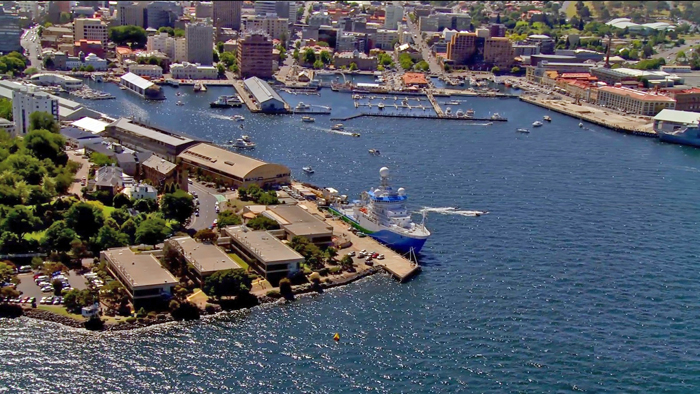The future of climate research in Australia is an issue tailor-made for Malcolm Turnbull to take a stand on. Yet he remains aloof from the debate.

Hobart’s Sullivans Cove, with CSIRO’s Marine Laboratories and its research ship Investigator in the foreground. PHOTO CSIRO
A notable centenary happens next month. On March 16, 1916, a young Australian nation took its first tentative steps into funded scientific research when prime minister Billy Hughes set up the Advisory Council of Science and Industry.
It was a modest affair. The council set up committees of experts who, while able to employ paid assistants, were expected to do their work without any pay. Unsurprisingly, this didn’t work.
Various governments experimented with different structures before finally settling on the Commonwealth Scientific and Industrial Research Organisation, now known by its acronym, often pronounced as “siro”.
CSIRO is fundamental to our national identity and underlies much of our prosperity. Employing over 4500 people throughout Australia, its research interests include agronomy, forestry, mining and manufacturing, health and nutrition, digital technology, space physics and natural ecosystems.
It also studies Earth’s structure and dynamics: the big systems that determine climate and provide energy to power our lives. The business division most concerned with these matters is run from CSIRO’s complex on the Hobart waterfront.
CSIRO’s diversity of research interests gives huge scope for brainstorming key questions. No other national science agency, anywhere, can match that in-house diversity – one reason why CSIRO attracts so much talent from around the world. It’s truly a national treasure.
CSIRO was early out of the blocks in putting resources into climate research, led for a decade by renowned atmospheric scientist Graeme Pearman. Its modelling and analysis – the best then and now for the Southern Hemisphere – gave it a global reputation.
That’s why the global scientific community was so shocked by this month’s announcement that climate research was to be cut in favour of making money from technology. The size of that shock can be measured in a single document.
Just five days after the announcement, a remarkable letter was sent from the US to prime minister Malcolm Turnbull, the CSIRO board and others spelling out the damaging consequences of downsizing this “vibrant and world-leading research program”.
The letter was signed by 2676 climate scientists, including 922 from the US, 391 from the UK, 200 from Germany and 159 from France. Equally remarkable is the spread of nations represented – 57 of them, including many developing countries.
The letter said continuing CSIRO’s multi-decadal study of Southern Hemisphere climate was critical to the success of global mitigation while also helping Australia address unresolved questions like food production, extreme events, tropical disease and Southern Ocean dynamics.
CSIRO chief executive Larry Marshall has said the time for analysing climate change has passed and its task now is to work out what to do to mitigate. Different problem, different skills.
But the two can’t be separated. To work out what to do we have to know how climate is changing globally, regionally and locally, and that includes translating global data to give us a stronger, more precise picture of our own situation. The need continues indefinitely. Same problem, same skills.
Of course scientists like to look out for their own, and of course there’s an element of self-interest here. People want to keep their jobs. But this is a matter of national importance. CSIRO’s decision calls into play scientific and policy questions that demand attention at the highest political levels.
As a backbencher in 2010 Malcolm Turnbull spoke out against his party’s prevailing sentiment that climate change was a non-event. When he became prime minister, many expected the government’s climate policies to be strengthened. That expectation is quickly vanishing.
Much of his party remains in denial about the gravity of the climate crisis, including backbench MP Dennis Jensen, who tweeted that climate science has been overfunded for decades.
For his part science minister Christopher Pyne has taken the lazy way out, saying the CSIRO decision was an internal matter. In fact it’s anything but internal, as the scientists’ letter shows.
If it stands, Australia’s scientific reputation and the integrity of both CSIRO and Turnbull himself will be irreparably damaged. Time is fast running out for the PM to stand up and be counted.
